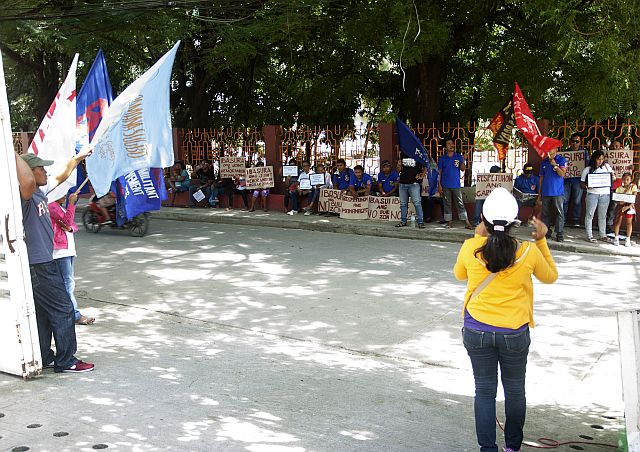Talks about fisherfolk relocation, no-build policy pushed

Bantayan fisherfolk hold a protest rally in front of the Department of Environment and Natural Resources, showing their opposition to the government’s ‘no-build zone’ policy. (CDN PHOTO/CHRISTIAN MANINGO).
EXACTLY three years after the onslaught of Super Typhoon Yolanda, the Department of Environment and Natural Resources in Central Visayas (DENR-7) is calling for a dialogue to find a solution to the problem of the Yolanda-affected fisherfolk’s relocation in Bantayan town as a means to adhere to the “no-build zone” policy and to give way for the establishment of eco-tourism sites.
Eduardo Enting, DENR-7 assistant regional director for technical services, made this call for a dialogue between DENR-7, the Bantayan town officials and Yolanda-affected fisherfolk after he learned of the fisherfolk’s plight and the Bantayan town’s plan to convert these areas into eco-tourism sites.
Enting was informed yesterday by around 50 Yolanda survivors, currently residing in Bantayan’s coastal barangays Suba and Guiwanon, and members of non-government organization Pamana-Sugbo, who held a protest rally at the DENR-7 office at Sudlon, Barangay Lahug in Cebu City yesterday.
The fisherfolk were protesting the “no build zone” policy of the government.
The “no-build zone” policy prohibits building structures within the 40-meter easement from the shoreline as it is regarded as a hazard zone during the onslaught of calamities, specially during storm surges.
The national offices of the DENR, Department of Public Works and Highways, Department of National Defense, Department of Interior and Local Government and the Department of Science and Technology signed the Joint Memorandum Circular (JMC) 2014 -1 last April 2014, which was also known as the “no-build zone” policy.
In Central Visayas case, DENR – 7 added that the provision also supports Presidential Decree (PD) 2151 which declares the entire Bantayan group of islands as an area of “protected wilderness,” and therefore disallowing people to occupy it.
DENR – 7 told fisherfolk that the presidential decree, which was made by former president Ferdinand Marcos, is still effective under the 1987 Philippine Constitution.
“After Yolanda, we realized the importance of PD 2151 as a solid ground in convincing people living in these hazard-prone areas to transfer to safer locations which our government has already provided for them. That’s why the government agreed on creating Joint Memorandum Circular 2014 -1,” Enting told the protesters.
However, since people had built several thriving communities within these areas, Enting added that they looked up on the possibility of amending Joint Memorandum Circular 2014-1 and PD 2151.
“We are doing our best just to ensure everyone’s safety, even before any disaster strikes,” he said.
For the fisherfolk, most of whom claimed that they are still recovering from the devastation of Yolanda, and opposed the “no-build zone” policy, because leaving the seashores would be tantamount to losing their source of income and food.
Freddie Valendez, acting chairperson for Pamana – Sugbo, stated that the relocation site was more than four kilometers away from their previous homes.
“Our catch after Yolanda is really less than usual. And now, they want us to be relocated in a place where they cannot provide an alternative livelihood for us.We really depend on fishing,” Valendez, a fisherman for more than 30 years, said in Cebuano.
Valendez said that there are around 150 families to be relocated within the 40-meter easement from the shoreline. He added that they receive the notice of relocation from officials of Bantayan Municipal Government just this year.
“We don’t know when they decided upon this. We saw the location and it’s too far away from the sea. It’s not easy carrying a boat from the land to the shores,” he commented in Cebuano.
Meanwhile, Valendez and some fisherfolk who knew about the relocation plans questioned their local government’s decision on using their residential areas as potential ecotourism-hosting sites.
“Now that we know our houses lie within these hazard zones, why do they want to put up resorts there?” stated Valendez in Cebuano.
Disclaimer: The comments uploaded on this site do not necessarily represent or reflect the views of management and owner of Cebudailynews. We reserve the right to exclude comments that we deem to be inconsistent with our editorial standards.
